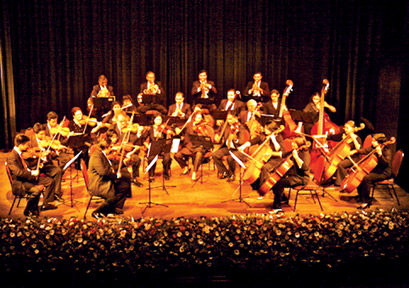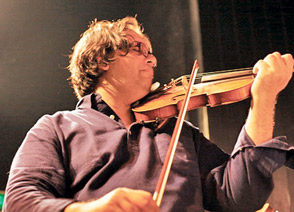Arts, censorship and conducting in post-modern context
By Ranga Chandrarathne
 |
|
Orchestra of the
Chamber Music Society |
In a wide ranging interview veteran musician and conductor Lakshman
Joseph de Saram expresses his views on Arts, Censorship and Conducting
in post-modern context.
(The first part of the interviewed was published on May 2 issue of
Montage)
Q: How far do you think a government should go in censoring the arts?
A: My emotional, unconditioned libertarian response is nowhere at
all. But as we know, the subject is as thorny as it comes. You may have
to get into the rationale of censorship first. The moral, the political,
the religious. It comes in all forms; and it's not always your
conservative government. Didn't Che Guevara, everyone's favourite
revolutionary, propose a ban on jazz and rock and roll? Rightist,
leftist, middle-ground, they all have their reasons.
The distinction between a government censor and a private one is not
immediately obvious in the arts. The big religious institutions are
famous for stepping up and protecting their faithful from the possible
evils of artistic expression, and they too have their reasons. Plus many
private artistic concerns receive governmental support through funding
and other means: with such support often comes some degree of state
supervision or control. It's irritating, it's as old as the hills, it is
global and, realistically, it will be around forever; but you develop an
awareness of the ever-changing ground-rules and learn to play the
banned/censored game to your advantage. There are people in the film
business who are masters at it!
I suppose a well-thought-out template where children's sensitivities
for example are protected is important, no matter how blurred the line
is between pornography and art. Beyond that, any sort of censorship of
the arts for adults, barring the universally illegal stuff, brings into
play ugly draconian elements. In a working democracy, no adult wants to
be told what he or she can or can't read, look at, or listen to.
 |
|
Lakshman Joseph de
Saram |
Q: Do you think a government should have a say in the quality and
content of arts organizations?
A: Only if the arts organization in question has been given a
government mandate to officially represent the country in their
respective field, then, yes. The Ministry of Culture/National Arts
Council could appoint an overseer on the organization's board, just to
make sure basic benchmarks are met, like on our national sports teams,
or any state-endorsed body. If you carry the name of your country, you
take on an enormous national responsibility, and therefore are wide open
to public scrutiny, criticism and accountability.
Q: How about the film industry and government involvement?
A. It's more cut and dried. We are talking more about content than
management and distribution right? So, if the film in any way represents
the country in an official capacity, and is a product of the government
film unit, the government has a right to suggest ideas. That's as far as
they should go in the creative process of a nation's film industry. On
the end product, all governments use their censor boards to telling
effect.
The most recent headline grabbing banning was of the Japanese film
Gurotesuku by the British Board of Film Classification, formally known
as the British Board of Film Censors. The sale of the DVD even to
forewarned adults is illegal in the UK. I'm sure, like all censor
boards, they are a collection of rational and righteous public servants
who have only the best interests of their citizens at heart. It's a
thankless job.
Q. Moving on to less controversial subjects, you have publicly stated
that you have a disdain for conductors. If that is true, why?
A. Not true! In jest, I may have shared an anti-conductor joke or two
with an audience at one of the Chamber Music Society's (conductor-less)
pre-concert talks. That's about it; I have great admiration for
conductors who are able to motivate musicians to reach heights that they
did not think they were capable of. I have great respect for conductors
whose vast knowledge of music, when combined with a certain intuition
and depth, can illuminate stunning aspects of a score that you were not
privy to before. These conductors are few and far between, but they make
being in the game worthwhile. On the lower levels, it is more about
basic people management, beating time and waking the triangle player
after 200 bars of rest. Uninspiring stuff, for the musicians and even
for the audience. Most of these conductors fail to even come close to
the tipping point, because they have usually lost the interest of the
musicians before the second rehearsal. It's endemic.
Q. What are the principals of conducting, other than beating time and
managing people?
A. Maestro Solti told us that true conductors are born, not made.
Even assuming you are one of the natal elect; the guiding principals of
top-flight conducting are still manifold.
First, it's all about gaining the respect of the orchestra, from the
Concertmaster to the non-union substitute gong player. You may want to
start, at the very least, with a complete study of (Hermann) Scherchen's
Handbook of Conducting - because you can be sure most of your Principals
will have. Then, there's a litany of boxes to tick before you can stand
before a group of musicians and tell them what to do: beat patterns, the
ictus, internal and explicit subdivisions, composite rhythm,
memorization of metronome speeds, modulation of tempo, strategies for
the successful execution of complex passages and dense textures,
balance, articulation, vocalization, intonation, transposition,
structure/analysis of the score - these are a few of the basics.
This is before you get into the intangible aspects of conducting:
"knowing" the score, the aura and allure, the all-important empathy you
have with the musicians to make the moment of re-creation meaningful -
these indispensables you can't teach. I remember conductors who after
the first rehearsal would take the principal players out for coffee for
a debate on the program. They would pitch their interpretation to us;
ask us if what they wanted was achievable. Having all your players on
the same page is vital.
Q: So, when we see a conductor on stage in front of a group of
musicians in a concert, what is he actually doing?
A: What a conductor does in front of a group of musicians is direct
them, primarily. Start them, stop them, cue them, make them go faster,
slower, softer, louder. But the real value we feel in having a conductor
is at the rehearsal phase. It's all about time management and direction.
He maps out the scores in his studio and comes to the rehearsal with a
blueprint that he is confident will work. It's his interpretation, and
why is this important? Because all of us in the orchestra have
blueprints and interpretations that we think are workable. So in
essence, what you are doing is appointing one massive ego to contain the
chaos of a 100 regular egos. It's like the military, where you have a
supreme commander planning a battle, who in turn gives the soldiers a
set of orders with predetermined objectives; or the head of a team of
surgeons planning a Whipple procedure or something. One guy maps out the
waypoints and makes the make or break decisions; and in an orchestra,
the conductor is that person. He takes the ultimate responsibility. We
give him the glory if his plan works, and it's the proverbial firing
squad if it does not. Pretty simple.
Q: If a conductor's work is mostly needed at the rehearsal phase, is
his presence at the concert dispensable?
A: Moot point. Technically, all the top orchestras in the world can
perform the most demanding symphonies of Mahler, Bruckner, Shostakovich
on auto-pilot; but that would be boring and unfair. After all the
diligent effort the conductor has put into the planning and development
of a work, he has to be given the controls when it's time to execute it
under the lights. And who knows? He could be inspired mid-flight to do
something spontaneous. These concerts are exhilarating.
Q: The Chamber Music Society's orchestra does not have a conductor,
why?
A: We are around 31 musicians, and employ a collaborative leadership
approach, loosely modelled on the Orpheus Chamber Orchestra. It's an
entirely different dynamic from the traditional method, but it works
beautifully for us. We have not ruled out having a conductor; we will if
and when it's appropriate.
Q: How about the managing of egos you spoke about before? Is it chaos
at the Chamber Music Society rehearsals?
A: Funny! No, no chaos. As the Artistic Director, I do pull rank
sometimes - but delicately!
Q: Who are some of the conductors, in your opinion, that have made an
impact?
A: My personal list of conductors of the past, in no particular
order, would include; (Sergiu) Celibidache, (Wilhelm) Furtwangler,
Carlos Kleiber, (Yevgeny) Mravinsky, (Hermann) Scherchen, (Carl)
Schuricht, (Georg) Solti, (Klaus) Tennstedt - give me more time, I am
sure I could come up with other names. But these maestros have truly
made an impact on how I listen to music specifically.
Q: How about present-day conductors?
A: I think it is a little unfair to measure or grade present-day
conductors. For one thing, I personally know a few of them, so it's
embarrassing. Also most of them are still in the process of building
their "legacies". But you can be assured, all of them have put in a ton
of hard work to get where they are now, know the nuts and bolts of the
game like the back of their hand, live music night and day, and have a
natural gift on top of it all. The path to the conductor's podium is
complex and merciless, and is littered with broken egos and splintered
batons.
That seems to be the only way, the baptism of fire. Otherwise, we
would all be conducting!
|

